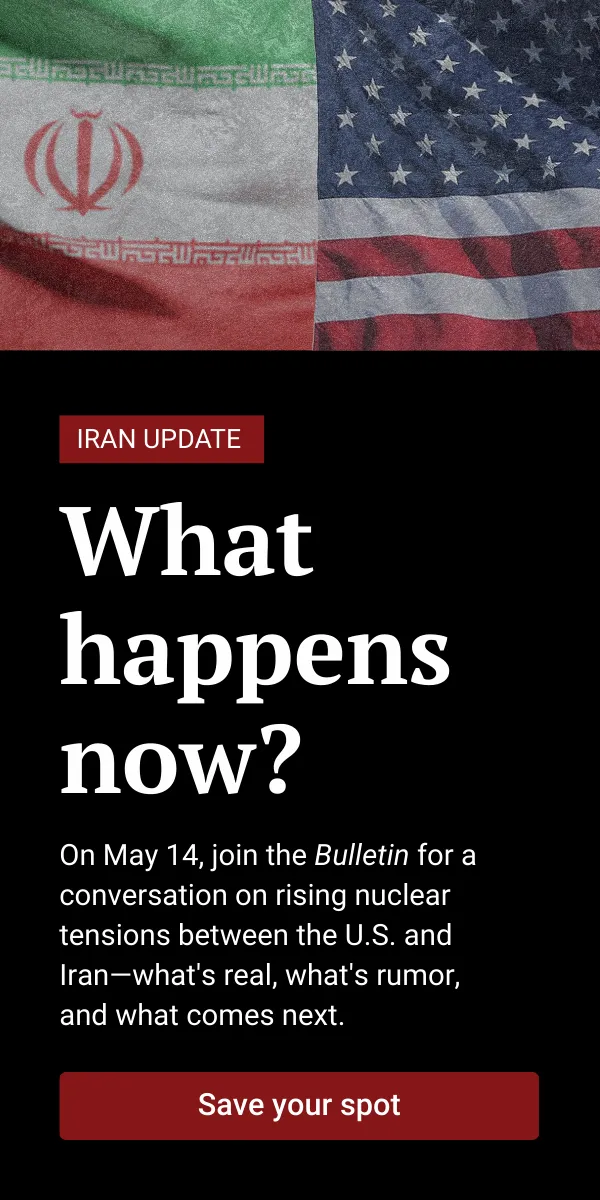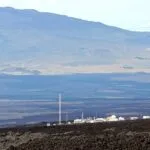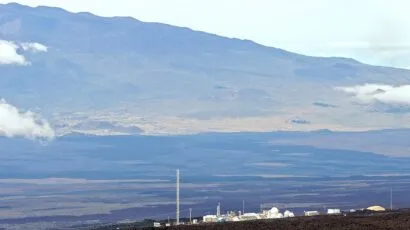Public opinion on nuclear energy: what influences it
By Ann S. Bisconti | April 27, 2016
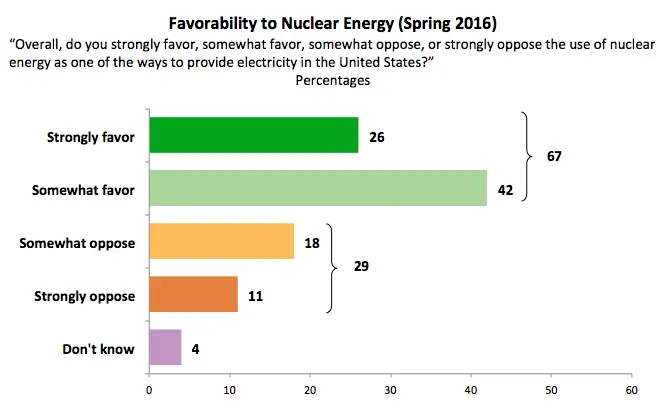
Two recent polls, one conducted by Gallup and the other by the University of Texas at Austin, seem to show public opinion about nuclear energy headed in different directions. A third survey, the spring 2016 nuclear energy survey by Bisconti Research for the Nuclear Energy Institute (NEI), found favorability numbers about the same as last year. Moreover, the percentages favoring nuclear energy in the three surveys diverged widely. In looking for the reasons for the vast differences in the poll results, one finds useful lessons about public opinion.
The poll results. Gallup’s annual Environmental Poll includes one question about nuclear energy: “Overall, do you strongly favor, somewhat favor, somewhat oppose, or strongly oppose the use of nuclear energy as one of the ways to provide electricity for the United States?” Gallup found 44 percent in favor and 54 percent opposed in 2016—a big drop in favorability from 2015—and headlined that, for the first time, a majority of Americans oppose nuclear energy.
The University of Texas at Austin Energy Poll asks: “Based on what you know, to what extent do you support or oppose the use of nuclear energy? (Strongly oppose, somewhat oppose, neither support nor oppose, somewhat support, strongly support, or not sure).” In contrast to Gallup, the UT poll found that support increased from 2015 to 2016. Currently, the poll shows, 39 percent strongly or somewhat support nuclear energy, 26 percent strongly or somewhat oppose nuclear energy, and 35 percent neither support nor oppose.
The NEI spring 2016 survey included, among many other questions about nuclear energy, the same question asked in the Gallup survey, and found 67 percent in favor of using nuclear energy as one of the ways to provide electricity, with 29 percent opposed. In fall 2015, 64 percent were in favor of nuclear energy, with 33 percent opposed.
Context matters. Public opinion on nuclear energy is highly changeable and easily influenced, because most Americans do not feel well informed about the subject. The UT poll shows many people in the middle. The NEI spring 2016 survey also found a large segment of the public sitting on the fence; 26 percent strongly favored nuclear energy and 11 percent strongly opposed it, leaving almost two-thirds of the public in the middle.
The context of any survey influences attitudes, as does the information people receive in the real world. Public opinion about nuclear energy reflects a tradeoff people make between perceptions of need and safety concerns. In the Gallup poll, the question about support for nuclear energy is asked along with questions about environmental concerns and hazards such as air pollution and the pollution of drinking water. In this context, safety concerns likely were at the forefront.
In the context of questions about energy, as in the UT Energy Poll, respondents are more inclined to think about need. In the NEI survey, the favorability question is always asked after a series of questions about nuclear energy, including support for license renewal and new plants.
Gallup’s primary explanation for the downturn in nuclear energy’s favorability in its most recent survey is that energy is not currently a big worry for most Americans. That is true. When energy is perceived to be abundant, as it is today, the perceived urgency for nuclear energy diminishes. Historically, resurgent strong support for nuclear energy coincides with periods characterized not only by electricity shortages but also by situations not especially relevant to nuclear energy—such as high gasoline prices or conflict in the Middle East. When energy is not a large worry, it is easier for concerns about safety to dominate, especially in the context of a discussion about hazards.
Energy is likely to remain abundant for years, so continued support for nuclear energy will depend on a better public understanding of the need not just for energy sources but for nuclear energy in particular. NEI research shows that Americans want both reliable electricity and clean air. Only nuclear energy is both a 24/7 baseload energy source like coal and natural gas, and also a low-carbon energy source like solar and wind. As such, nuclear energy is unique and irreplaceable.
Awareness increases support. As public awareness of nuclear energy’s benefits grows, so too does public support. NEI surveys show a direct correlation between feeling informed about nuclear energy and favorable attitudes. In spring 2016, 21 percent of Americans said they felt very well informed about nuclear energy, 42 percent somewhat well informed, 26 percent not too well informed, and 11 percent not at all well informed. Among those who felt very well informed, three times as many strongly favored nuclear energy (54 percent) as strongly opposed it (18 percent).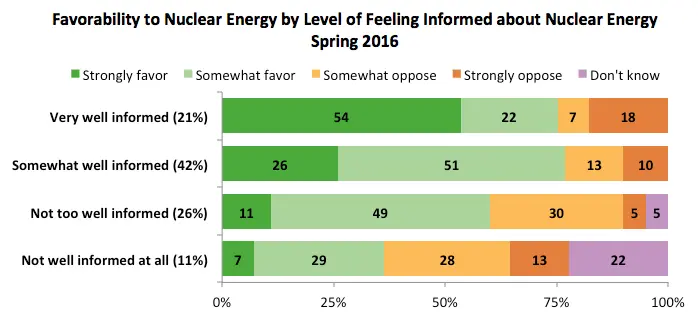
NEI surveys find that most Americans agree with the concept that “we should take advantage of all low-carbon energy sources including nuclear, hydro, and renewable energy to produce the electricity we need while limiting greenhouse gas emissions.” In spring 2016, 82 percent agreed. However, there is little awareness of nuclear energy’s role in this mix, previous NEI surveys have shown. In a March 2014 survey, 67 percent thought nuclear energy releases greenhouse gases. In a September 2015 survey, 70 percent were unaware that among the low-carbon energy sources—such as solar, wind, hydro, and nuclear energy—nuclear energy produces the most electricity by far.
The spring 2016 survey included a question to study the impact of new information about nuclear energy’s special role: “Nuclear energy produces 63 percent of low-carbon electricity in the United States. And given that nuclear energy is the only electricity source that provides both clean air and continuous 24/7 electricity, do you think nuclear energy should be very important, somewhat important, not too important, or not at all important in the future?” A large majority, 86 percent, said that nuclear energy should be important, including 59 percent of those initially opposed to nuclear energy and 29 percent of those initially strongly opposed. So this surprising new information did have a substantial impact.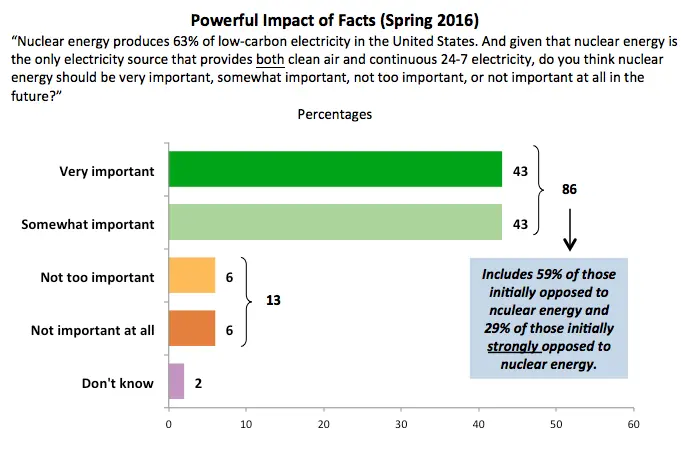
Familiarity also increases support. The fact that familiarity increases public support for nuclear energy is apparent from the very favorable attitudes of people who live near nuclear power plants. In addition to national surveys conducted at least twice a year, NEI sponsors biennial surveys of people living within a 10-mile radius of any US nuclear power plant. The surveys exclude households with anyone who works at the plant. A total of 1,080 plant neighbors at 60 sites were surveyed in 2015. The vast majority, 83 percent, favored nuclear energy, and 50 percent strongly favored nuclear energy.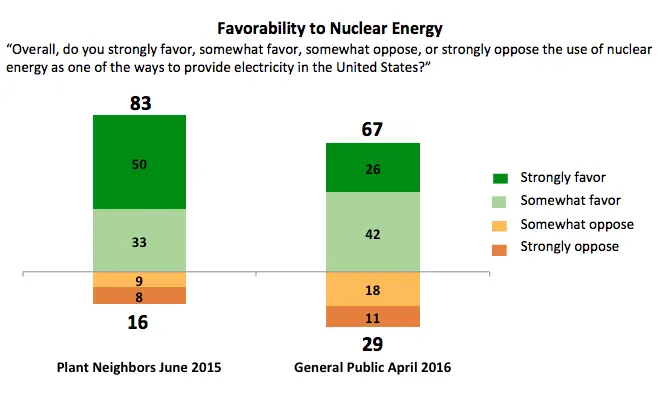
This high level of favorability to nuclear energy is a result of the awareness gained from living in the vicinity of a nuclear power plant. It is due to familiarity with the local plant, the people who work there, and with the myriad ways the plant and the people engage with the communities. Nearly 90 percent of plant neighbors have a favorable impression of the nearby plant and how it has operated recently, which helps to account for why 83 percent favor nuclear energy in general. In line with these survey findings, all five of the nuclear power plants now under construction are in communities with existing plants and with solid local support.
Together, we make the world safer.
The Bulletin elevates expert voices above the noise. But as an independent nonprofit organization, our operations depend on the support of readers like you. Help us continue to deliver quality journalism that holds leaders accountable. Your support of our work at any level is important. In return, we promise our coverage will be understandable, influential, vigilant, solution-oriented, and fair-minded. Together we can make a difference.
Topics: Analysis, Nuclear Energy

